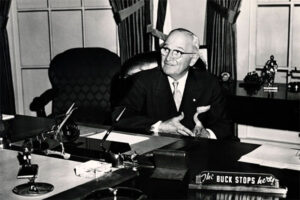The last thing David Ponder cried out before his car smashed into the tree was, “Why me?”
Often, many of us who are not in the place we wanted to be, making the money we want to make, or not doing the work we truly want to do, are like David and wonder, “Why me?”
Why are things so bad? If not bad, why are things not as good as they can be?
The answer given to David by Harry Truman was, “outside influences are not responsible for where you are today—mentally, physically, spiritually, emotionally, and financially—because of decisions I have made. You have chosen the pathway to your present destination. The responsibility for your situation is yours.”
David was in a bad spot and was unhappy with Truman’s statement.
How many of us would like to be told that we are where we are because of the decision we made?
This is actually good news.
If we get ourselves into the situation based on our thinking, we could get out of the situation by changing the decisions we make.
The alternative is that we are helpless to change our circumstances.
The Harry Truman David Ponder Met
 Truman was an “everyman” and lived out much of what he counseled David to do, take ownership of his decisions.
Truman was an “everyman” and lived out much of what he counseled David to do, take ownership of his decisions.
He was born in Lamar, Missouri, in 1884. During his earlier life, he was a farmer. He was a captain during World War I, and after the war, he married and moved to Kansas City, where he opened an unsuccessful haberdashery, aka a shop for men’s clothing and accessories.
He was active in the Democratic Party and became a US Senator in 1934. Franklin Roosevelt selected Truman as his running mate during his campaign to remain president.
When FDR died shortly into his fourth term as president, Truman became the 33rd President on April 12, 1945.
Before becoming President, Truman had not been briefed on the development of the atomic bomb or the unfolding difficulties with Soviet Russia.
When David Ponder met Truman, Davis was told it was July 24, 1945, and they were in Potsdam. This is the day Truman will tell the Soviet leader Joseph Stalin that America has successfully detonated the first atomic bomb eight days earlier.
What Are We To Do?
We read in the full text of the first decision, “I understand that God did not put in me the ability to always make right decisions. He did, however, put in me the ability to make a decision and then make it right.”
If we want to live a full and prosperous life, however, we define it, we need to own our decisions.
If we stay at a job we hate, we must own that decision and the consequences.
For me, I stayed in a job I hated too long because I was scared to leave. More than a decade and a half later, I am still hampered by the stress-induced autoimmune disease (psoriatic arthritis).
David was in the situation he was in because of his decisions, even though he angrily cried out to Truman, “That’s not true.”
Listen to me now. You are where you are because of your thinking. Your thinking dictates your decisions. Decisions are choices. Years ago, you chose where you would attend college. You chose your course of study. When you graduated with the degree you chose to pursue, you chose the companies to which you would send a resume. After interviewing with the companies that responded, you chose the one for which you would work. ~Truman to David on page 27
Truman continued to show David the impact of each decision he made, even the decision to eat rib-eye steaks or to eat hot dogs.
Every decision is important since our thinking creates patterns in our minds.
Exercises To Do
On page 9 of “The Seven Decisions,” there is a section called Trading Freedom.
That section asks, “Are you trading your beauty and freedom to help someone else’s dreams come true? Way too many people trade out their freedom for security, and they don’t even realize it. There is a difference between an opportunity you seize* and a trap you walk into. Being aware of the choice and trap is the key.”
Answer the question about trading your beauty and freedom.
Ask yourself and contemplate how much freedom you have given up to have “job security.” Is that security worth more or less than the freedom you gave up?
T. Harv Eker said, “There’s nothing wrong with getting a steady paycheck unless it interferes with your ability to earn what you’re worth. There’s the rub. It usually does.”
Is your paycheck worth less than the freedom you give up? Does it provide what you’re worth?
If so, congrats. If not, you are responsible for changing things.




